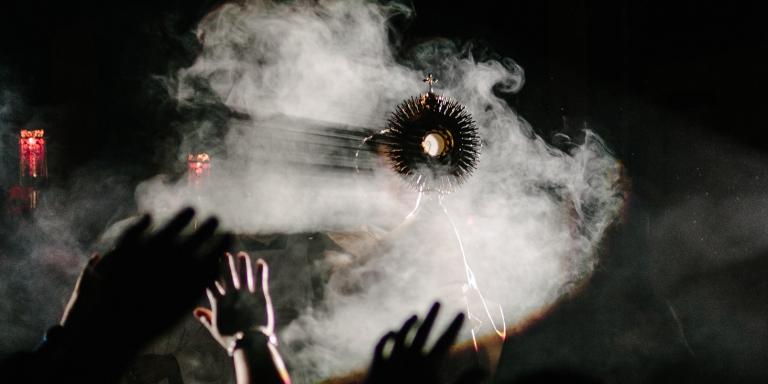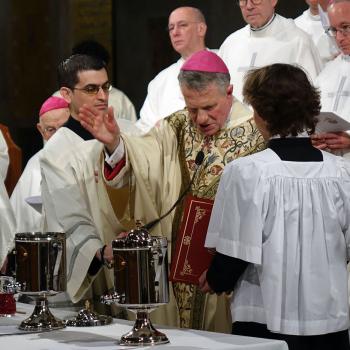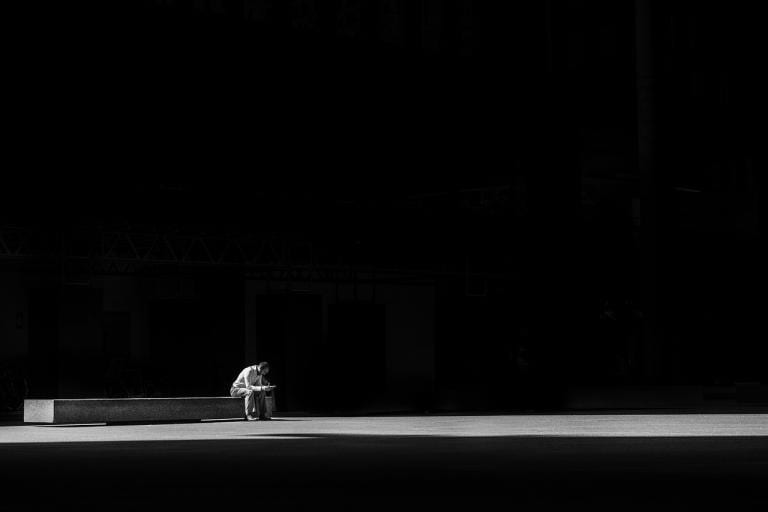Writing about God is difficult. It’s almost as hard as writing a good sex scene. You can write about the idea of God, of course. You can defend God. Argue in favour of God’s existence. Argue endlessly about what God would probably want if He showed up and weighed in on the state of the modern world. It’s easy to write around God. But to write about God is a different thing.
Because God isn’t a concept, an idea, a champion or a moralizer. God is God. He is simultaneously so completely Other that anything we say about Him is kind of laughable and cartoonish. Even something like the use of male pronouns is misleading – though the use of female pronouns or impersonal pronouns would just be misleading in a different way. Any statement that we make about God, any analogy that we draw, is going to be more unlike than like God.
And yet, at the same time, all of the analogies do contain some truth.
I was thinking about this a while ago when I was in Eucharistic adoration. It was hard to go. I was angry at the Church about a lot of things and of course some of that anger had transferred over to God. But I figured if nothing else, it would be a silent moment in a place that had been dedicated for a long time to silence. Even if the Church was corrupt and God didn’t exist, the fact that spaces which are made to be peaceful do, in fact, have a tendency to provoke feelings of peace is a readily observable, empirical fact.
So I went in and knelt down and there was that immediate sensation of a weight being taken off my shoulders. Muscles that I didn’t even know had been tensed up starting to relax. God asked if I was happy if I had come, and I thought about that for a while before I answered. It was odd because the sense of peace, being in the presence of the Eucharist, came freighted with a whole bunch of irritations – things that were triggering me. Finally I got it down to a coherent thought, “I love you,” I said, addressing the blank, pale, impenetrable host, “but the monstrance is really bothering me.”
It wasn’t that the monstrance in this particular chapel was an especially egregious specimen. It was very normal really: lots of gold, little ceramic portraits of the apostles, rays shaped like a sun. But it seemed like a distraction, like if you put a sublimely beautiful abstract into a clunky, overwrought gold frame. The beauty of the Eucharist lay in that elegant simplicity, its resemblance to a screen where all of the projections that we put on God go to die. The monstrance just seemed like it was trying to tell a story, to build up a series of associations and meanings that clustered around the central mystery, obscuring and in a sense even overawing truth. It suggested that the Eucharist would not attract or hold anybody’s attention if you didn’t artificially wreath it in glitz.
The thing is, if you spend time with God (and this is one of the reasons why I think God is real), there’s a way in which your view of things slowly transforms. In my experience, it slowly transforms into a view that is softer, more forgiving, more tolerant. I believe that God very deeply loves His creation, and that His love is not narcissistic or controlling. I think He’s the kind of father who walks in on the kids happily making a mess in the dining room, and who doesn’t say “What are you doing? Clean that up! You’ve ruined the furniture!” but “Let me see what you’ve painted. Tell me about your game.”
So, slowly, being there just sort of resting in His presence, I started to see the monstrance differently. At first, He gently directed my thoughts towards the artist who had made it. Somebody had put time and thought and effort, and love, into creating this golden monstrosity. And they had done it because they wanted in their hackneyed way to give to glory to God. I could relate to that. I wanted that too, for my art. And I wanted God to be happy to be shown forth in the bizarre monstrances that I create for Him out of words.
That softened me a lot. But the meditation went further. There were people too who worked and had given their money to buy the gold and to pay the artist. Maybe some of them had been wealthy and wanted to show off their wealth. But maybe they had been poor too. And perhaps that didn’t matter all that much: either way, they wanted to make something beautiful for God and they gave the work of their hands to do it. Another thing I could respect.
And so it went, God slowly revealing the monstrance as humanity striving after God, surrounding him with overwrought arguments and gilded promises. Putting ourselves constantly into the picture, trying to gain credibility by proximity to Him. But at the same time, trying to hold up this weightless weight that we do not at all understand, that we simultaneously love and fear, that we cannot control – not even as an object of intellectual appropriation. This Other.
This Other who is as intimate as our inmost selves. Who we must explain, and cannot.
The monstrance is, in a sense, my hands trying to hold up God and make Him visible.
And in doing so, of course there are these places where my fingers get in the way, just like the golden rays of the monstrance obscure parts of the host. Of course there is a reflective pane of glass in front of the mystery, holding it in, trying to keep it safe. But the purpose for all of that, when it comes down to it, is not a craving to clutch and hold the Eucharist as my very own, a need to distract from it with vainglorious flourishes, or a desire to see my own reflection when I try to look at Christ. Those things happen because I am human, because my own subjectivity is the glass through which I see darkly. But they are not the true and secret desire of my heart.
What I desire is that God that I cannot hold, control and tame. What I want is that intimate communion with not-me. The fact that I am always getting in the way is a frustration, not a feature.
But knowing that of myself makes it easier, then, to have compassion for all of the other humans whose striving to know God and, God help us, to portray the God we are trying to know. The monstrance is wealth seeking to draw attention to a mystery that looks like a poor-man’s bread. It is art trying to illustrate the inner radiance of something that appears to be a cracker. It is religion attempting to illuminate the fantastic truth of a God who is here, really present, in the most intimate way, in the simplest realities that sustain our lives. It is theology and philosophy building up clunky towers of inadequate words in an attempt to describe the indescribable.
To hold the monstrance in contempt is, in effect, to condemn humanity. But that is not, I think, how God sees it. I don’t think He sees our condition as essentially pitiable, broken, inadequate. I don’t think God is ashamed to be held up for veneration by our childish attempts to represent glory. I think that while He certainly corrects our efforts, helps us grow so that we can better express this painful and wondrous beauty that we find without us and within, none the less He is not a critic. He is a parent. And He loves the way that we reach up with our dirty little hands to touch His face.
Image credit: pixabay
Stay in touch! Like Catholic Authenticity on Facebook:
















